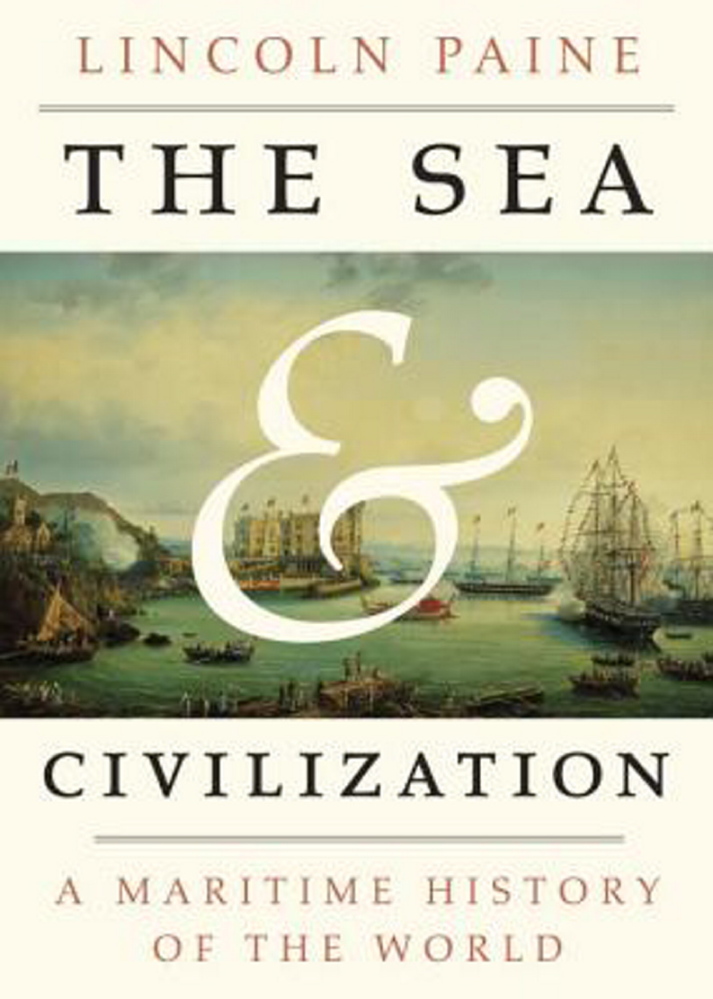THE SEA & CIVILIZATION: A MARITIME HISTORY OF THE WORLD
By Lincoln Paine
Alfred A. Knopf, 2013
744 pages, $40
ISBN 978-1-4000-4409-2
Fans of maritime history will be familiar with Portland author Lincoln Paine, whose previous four books have set a high standard for thorough research and quality historical writing and storytelling.
Three of those books focused on the history of ships. The other is purely Maine: “Down East: A Maritime History Of Maine” (Tilbury House, 2000). And this most recent book is his most fascinating and ambitious success yet.
“The Sea & Civilization” presents an excellent, comprehensive “consciousness of the sea and the growing realization that maritime history offers an invaluable perspective on the history of the world and ourselves.”
This massive volume expertly describes how world history, from antiquity to today, has been shaped by the world’s seas. Paine tells how ancient societies, thousands of years ago, were driven to use the seas (including coastal waters and rivers) by geography, human migration, wars, trade and imperial expansion.
He wisely contrasts how island societies naturally came to use the seas, with continental (land) societies’ more complex motivations, and how the primary focus on maritime use was commerce, followed by naval activity for trade protection and establishment of overseas colonies (also trade-based).
Paine covers everything from the Bronze Age of Seafaring (Egypt), the Silk Road of the Seas (Asia) and global oceanographic exploration, to centuries of development of sea-borne navigation aids and ship design, the Machine Age of steam power, ironclads and today’s container ships.
Learn how sea power was used to create huge, rich empires, how the Black Plague actually stimulated overseas trade and wealth, why Europeans dominated global trade for four centuries and why the Mediterranean Sea was once known as the Center of the World.
For other interesting related reading see, “The Way Of The Ship: America’s Maritime History Reenvisioned, 1600-2000” by Alex Toland (Wiley, 2008).
LIGHT ON JIB ISLAND
By Jan Gilley
Maine Authors Publishing, 2013
167 pages, $14.95
ISBN 978-1-938883-66-8
Writing high-quality, wholesome fiction for middle school youngsters isn’t easy, but Camden author and educator Jan Gilley has done it beautifully with her debut novel, “Light On Jib Island.”
Best of all, she did it without any kitschy vampires, wizards or iPhones.
Gilley’s first novel is a triumph of smart, colorful and engaging storytelling, as she tells a sensitive and inspirational tale about a Maine lighthouse family in 1921-1922.
Twelve-year-old Lizzie Barton and her family live on Jib Island, on the Maine coast just offshore from the coastal town of Camden (the cover art even resembles Camden’s Curtis Island Light). Her father is the light keeper, and her mother and three brothers make up a happy, industrious, self-reliant family, content with the beauty and isolation of island living.
Life isn’t easy, however, as the family must cope with storms, high seas, cold winters and constant lighthouse chores. Lizzie is a bright, considerate girl who loves her family, but her mother’s unexpected, difficult pregnancy requires that she assume all the household duties, a huge responsibility for a young girl.
Lizzie, the dreamer who longs to go to a real school and have a sister or best girlfriend, must now face daunting challenges — especially when a shipwreck leaves a sole survivor in her tender care, and disturbing news upsets her faith.
Throughout this heartwarming story, the Barton family sticks together in both happy and sad times, relying on each other for love, support and understanding — life lessons for readers of all ages. Gilley also provides excellent historical portrayals of island living, light-keeping, home-schooling and the unique functioning of the U.S. Lighthouse Service.
This is a vibrant and well-crafted story, and we can only hope Gilley has more to tell.
Bill Bushnell lives and writes in Harpswell.
Send questions/comments to the editors.




Success. Please wait for the page to reload. If the page does not reload within 5 seconds, please refresh the page.
Enter your email and password to access comments.
Hi, to comment on stories you must . This profile is in addition to your subscription and website login.
Already have a commenting profile? .
Invalid username/password.
Please check your email to confirm and complete your registration.
Only subscribers are eligible to post comments. Please subscribe or login first for digital access. Here’s why.
Use the form below to reset your password. When you've submitted your account email, we will send an email with a reset code.